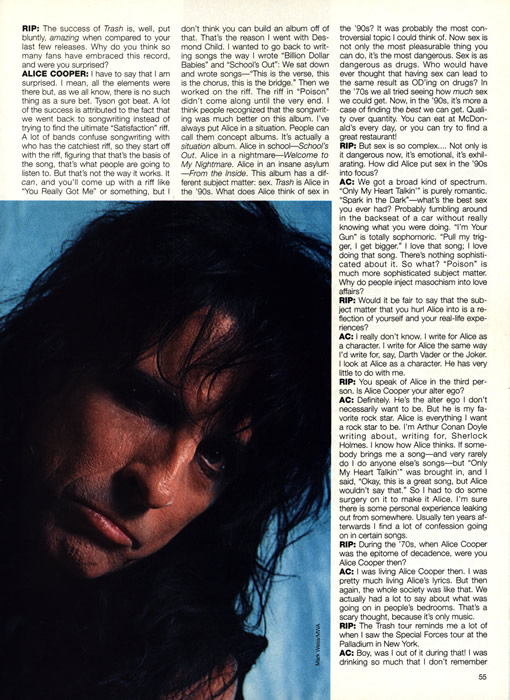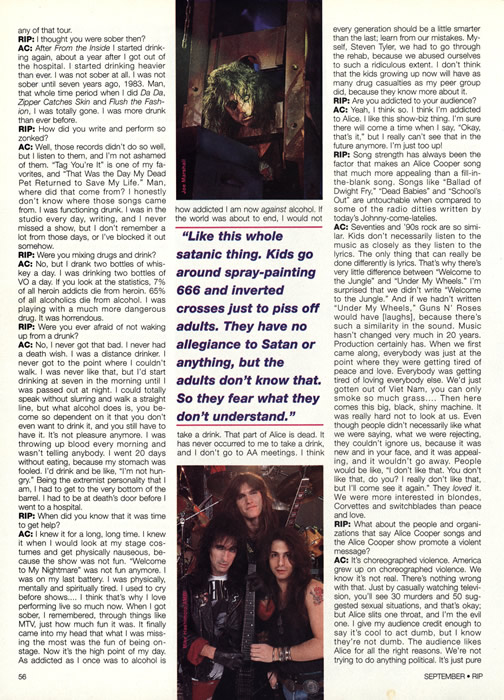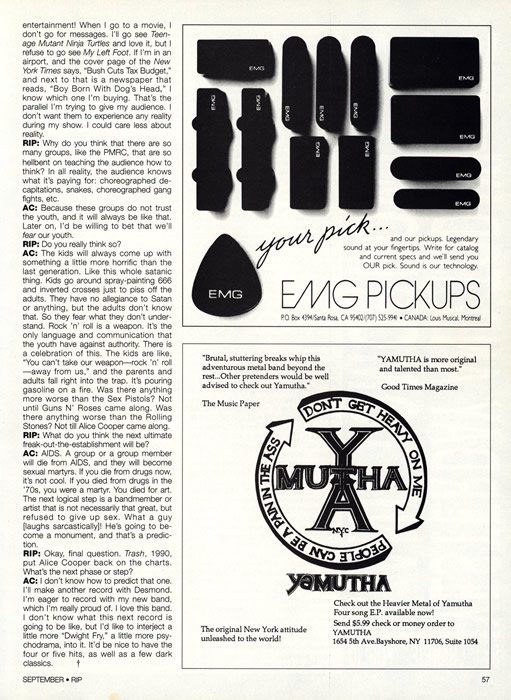Article Database
Alice Cooper, Nice Guy with a Guillotine
Alice Cooper is an American rock legend. When he first erupted on the world some 20 years ago, the critics scoffed, the world was appalled, and his legacy grew. Cooper has beaten everyone and everything - including his long-term bout with alcoholism - by doing things in his own inimitable manner. 1990 and the success of Trash mark the beginning of a new Alice Cooper generation, his third as a performer.
Cooper created his most important music during the black spot of American creativity: the '70s. While the rest of America was ravaged with Saturday Night Fever, wearing polyester proudly and smoking paraquat, only Aerosmith, Ted Nugent and Alice Cooper carried the American rock flag through the decade. Now that it's the '90s, Alice Cooper has been reborn thanks to a new generation of rock fans who probably weren't around during the Welcome to My Nightmare tour. The ongoing World Trash Tour '90 holds its own against any past Cooper production. It's a perfect blend of classic and new Cooper material, and the theatrics are vintage Alice!
Riding on the Cooper tour bus from one city to another with Alice and his permanent band - guitarist Pete Freezin and Al Pitrelli, bassist T-Bone Caradonna, keyboard player Derick Sherinian and drummer Eric Singer - I have to admit I'm a bit in awe of Alice. After all, he's penned songs like "Teenage Lament" and "Lace and Whiskey," songs that helped me - still help me - get through troubled times. But the reality is that Alice Cooper is a soft-spoken, down-to-earth guy who has a grip on what's going on around him and tries not to take it too seriously. His passion for gold and bad karate movies are a reflection of a man who is usually seen growling, but behind closed doors would rather be smiling. As Cooper guitarist Al Pitrelli says, "He's just the ordinary guy next door...with a guillotine."
RIP: The success of Trash is, well, put bluntly, amazing when compared to your last few releases. Why do you think so many fans have embraced this record, and were you surprised?
ALICE COOPER: I have to say that I am surprised. I mean, all the elements were there but, as we all know, there is no such thing as a sure bet. Tyson got beat. A lot of the success is attributed to the fact that we went back to songwriting instead of trying to find the ultimate "Satisfaction" riff. A lot of bands confuse songwriting with who has the catchiest riff, so they start off with the riff, figuring that that's the basis of the song, that's what people are going to listen to. But that's not the way it works. It can, and you'll come up with a riff like "You Really Got Me" or something, but I don't think you can build an album off of that. That's the reason I went with Desmond Child. I wanted to go back to writing songs the way I wrote "Billion Dollar Babies" and "School's Out": We sat down and wrote songs - "This is the verse, this is the chorus, this is the bridge." Then we worked on the riff. The riff in "Poison" didn't come along until the very end. I think people recognized that the songwriting was better on this album. I've always put Alice in a situation. People can all them concept albums. It's actually a situation album. Alice in school - School's Out. Alice in a nightmare - Welcome to My Nightmare. Alice in an insane asylum - From the Inside. This album has a different subject matter: sex. Trash is Alice in the '90s. What does Alice think of sex in the '90s? It was probably the most controversial topic I could think of. Now sex is not only the most pleasurable thing you can do, it's the most dangerous. Sex is as dangerous as drugs. Who could have ever thought that having sex can lead to the same result as OD'ing on drugs? In the '70s we all tried seeing how much sex we could get. Now, in the '90s, it's more a case of finding the best we can get. Quality over quantity. You can eat at McDonald's every day, or you can try to find a great restaurant!
RIP: But sex is so complex... Not only is it dangerous now, it's emotional, it's exhilarating. How did Alice put sex in the '90s focus?
AC: We got a broad kind of spectrum. "Only My Heart Talkin'" is purely romantic. "Spark in the Dark" - what's the best sex you every had? Probably fumbling around in the backseat of a car without really knowing what you were doing. "I'm Your Gun" is totally sophomoric. "Pull my trigger, I get bigger." I love that song; I love doing that song. There's nothing sophisticated about it. So what? "Poison" is much more sophisticated subject matter. Why do people inject masochism into love affairs?
RIP: Would it be fair to say that the subject matter that you hurl Alice into is a reflection of yourself and your real-life experiences?
AC: I really don't know. I write for Alice as a character. I write for Alice the same way I'd write for, say, Darth Vader or the Joker. I look at Alice as a character. He had very little to do with me.
RIP: You speak of Alice in the third person. Is Alice Cooper your alter ego?
AC: Definitely. He's the alter ego I don't necessarily want to be. But he is my favorite rock star. Alice is everything I want a rock star to be. I'm Arthur Conan Doyle writing about, writing for, Sherlock Holmes. I know how Alice thinks. If somebody brings me a song - and very rarely do I do anyone else's songs - but "Only My Heart Talkin'" was brought in, and I said, "Okay, this is a great song, but Alice wouldn't say that." So I had to some surgery on it to make it Alice. I'm sure there is some personal experiences leaking out from somewhere. Usually ten years afterwards I find a lot of confession going on in certain songs.
RIP: During the '70s, when Alice Cooper was the epitome of decadence, were you Alice Cooper then?
AC: I was living Alice Cooper then. I was pretty much living Alice's lyrics. But then again, the whole society was like that. We actually had a lot to say about what was going on in people's bedrooms. That's a scary though, because it's only music.
RIP: The Trash tour reminds me a lot of when I saw the Special Forces tour at the Palladium in New York.
AC: Boy, was I out of it during that! I was drinking so much that I don't remember any of that tour.
RIP: I thought you were sober then?
AC: After From the Inside I started drinking again, about a year after I got out of the hospital. I started drinking heavier than ever. I was not sober at all. I was not sober until seven years ago, 1983. Man, that whole time period when I did Dada, Zipper Catches Skin and Flush the Fashion, I was totally gone. I was more drunk than ever before.
RIP: How did you write and perform so zonked?
AC: Well, those records didn't do so well, but I listen to them, and I'm not ashamed of them. "Tag, You're It" is one of my favorites, and "That Was the Day My Dead Pet Returned to Save My Life." Man, where did that come from? I honestly don't know where those songs came from. I was functioning drunk. I was in the studio every day, writing, and I never missed a show, but I don't remember a lot from those days, or I've blocked it out somehow.
RIP: Were you mixing drugs and drink?
AC: No, but I drank two bottles of VO a day. If you look at the statistics, 7% of all heroin addicts die from heroin. 65% of all alcoholics die from alcohol. I was playing with a much more dangerous drug. It was horrendous.
RIP: Where you ever afraid of not waking up from a drunk?
AC: No, I never got that bad. I never had a death wish. I was a distance drinker. I never got to the point where I couldn't walk. I was never like that, but I'd start drinking at seven in the morning until I was passed out at night. I could totally speak without slurring and walk a straight line, but what alcohol does is, you become so dependent on it that you don't even want to drink it, and you still have to have it. It's not pleasure anymore. I was throwing up blood every morning and wasn't telling anybody. I went 20 days without eating, because my stomach was fooled. I'd drink and be like, "I'm not hungry." Being the extremist personality that I am, I had to get to the very bottom of the barrel. I had to be at death's door before I went to a hospital.
RIP: When did you know that it was time to get help?
AC: I knew it for a long, long time. I knew it when I would look at my stage costumes and get physically nauseous, because the show was not fun. "Welcome to My Nightmare" was not fun anymore. I was on my last battery. I as physically, mentally and spiritually tired. I used to cry before shows... I think that's why I love performing live so much now. When I got sober, I remembered, through things like MTV, just how much fun it was. It finally came into my head that what I was missing the most was the fun of being onstage. Now it's the high point of my day. As addicted as I once was to alcohol is how addicted I am now against alcohol. If the world was about to end, I would not take a drink. That part of Alice is dead. It has never occurred to me to take a drink, and I don't go to AA meetings. I think every generation should be a little smarter than the last; learn form our mistakes. Myself, Steven Tyler, we had to go through the rehab, because we abused ourselves to such a ridiculous extent. I don't think that the kids growing up now will have as many drug casualties as my peer group did, because they know more about it.
RIP: Are you addicted to your audience?
AC: Yeah, I think so. I think I'm addicted to Alice. I like this show-biz thing. I'm sure there will come a time when I say, "Okay, that's it," but I really can't see that in the future anymore. I'm just too up!
RIP: Song strength has always been the factor that makes an Alice Cooper song that much more appealing than a fill-in-the-blank song. Songs like "Ballad of Dwight Fry," "Dead Babies and "School's Out" are untouchable when compared to some of the radio ditties written by today's Johnny-come-latelies.
AC: Seventies and '90s rock are so similar. Kids don't necessarily listen to the music as closely as they listen to the lyrics. The only thing that can really be done differently is lyrics. That's why there's very little difference between "Welcome to the Jungle" and "Under My Wheels". I'm surprised that we didn't write "Welcome to the Jungle." And if we hadn't written "Under My Wheels," Guns N' Roses would have [laughs], because there's such a similarity in the sound. Music hasn't changed very much in 20 years. Production certainly has. When we first came along, everybody was just at the point where they were getting tired of peace and love. We'd just gotten out of Viet Nam, you can only smoke so much grass... Then here comes this big, black, shiny machine. It was really hard not to look at us. Even though people didn't necessarily like what we were saying, what we were rejecting, they couldn't ignore us, because it was new and in your face, and it was appealing, and it wouldn't go away. People would be like, "I don't like that. You don't like that, do you? I really don't like that, but I'll come see it again." They loved it. We were more interested in blondes, Corvettes and switchblades than peace and love.
RIP: What about the people and organizations that say Alice Cooper songs and the Alice Cooper show promote a violent message?
AC: It's choreographed violence. America grew up on choreographed violence. We know it's not real. There's nothing wrong with that. Just by casually watching television, you'll see 30 murders and 50 suggested sexual situations, and that's okay; but Alice slits one throat, and I'm the evil one. I give my audience credit enough to say it's cool to act dumb, but I know they're not dumb. The audience likes Alice for all the right reasons. We're not trying to do anything political. It's just pure entertainment! When I got to a movie, I don't got for messages. I'll go see Teenage Mutant Ninja Turtles and love it, but I refuse to go see My Left Foot. If I'm in an airport, and the cover page of the New York Times says, "Bush Cuts Tax Budget," and next to that is a newspaper that reads, "Boy Born With Dog's Head," I know which one I'm buying. That's the parallel I'm trying to give my audience. I don't want them to experience any reality during my show. I could care less about reality.
RIP: Why do you think that there are so many groups, like the PMRC, that are so hellbent on teaching the audience how to think? In all reality, the audience knows what it's paying for: choreographed decapitations, snakes, choreographed gang fights, etc.
AC: Because these groups do not trust youth, and it will always be like that. Later on, I'd be willing to bet that we'll fear our youth.
RIP: Do you really think so?
AC: The kids will always come up with something a little more horrific than the last generation. Like this whole satanic thing. Kids go around spray-painting 666 and inverted crosses just to piss off the adults. They have no allegiance to Satan or anything, but the adults don't know that. So they fear what they don't understand. Rock 'n' roll is weapon. It's the only language and communication that the youth have against authority. There is a celebration of this. The kids are like, "You can't take our weapon - rock 'n' roll - away from us," and the parents and adults fall right into the trap. It's pouring gasoline on a fire. Was there anything more worse than the Sex Pistols? Not until Guns N' Roses came along. Was there anything worse than the Rolling Stones? Not till Alice Cooper came along.
RIP: What do you think the next ultimate freak-out-the-establishment will be?
AC: AIDS. A group or a group member will die from AIDS, and they will become sexual martyrs. If you die from drugs now it's not cool. If you died from drugs in the '70s, you were a martyr. You died for art. The next logical step is a bandmember or artist that is not necessarily that great, but refused to give up sex. What a guy [laughs sarcastically]! he's going to become a monument, and that's a prediction.
RIP: Okay, final question. Trash, 1990, put Alice Cooper back on the charts. What's the next phase or step?
AC: I don't know how to predict that one. I'll make another record with Desmond. I'm eager to record with my new band, which I'm really proud of. I love this band. I don't know what this next record is going to be like, but I'd like to interject a little more "Dwight Fry," a little more psychodrama, into it. It'd be nice to have the four or five hits, as well as a few dark classics.







